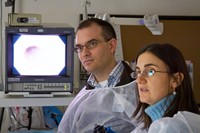Clinical
Division of Gastroenterology & Hepatology:
CLINICAL
Division physicians diagnose and treat a wide range of GI- and liver-related diseases and conditions. Inpatient care is delivered at UVA Hospital, outpatient care at the hospital and at Western Albemarle Family Medicine, and luminal and hepatology consults at UVA Hospital and the Transitional Care Hospital at Northridge. The division also provides outpatient care at UVA’s Zion Crossroads facility, which opened in 2013.
Procedures are performed both at UVA Hospital and at the nearby Outpatient Surgery Center. During FY 2014, division faculty performed more than 12,000 specialty procedures, and provided:
- 6,161 inpatient attending visits
- 2,364 inpatient consults
- 13,085 outpatient visits
The focal point for the division’s clinical activities is the Center for Digestive Health at UVA Hospital, which had approximately 15,000 patient visits in the last year. The Center’s hepatology service treats both acute and chronic liver diseases, with interventions including anti-viral therapy, liver biopsy, endoscopic management, and large-volume paracentesis. The unit works closely with the Biliary Endoscopy service and with the Liver Transplant program, which performs over 75 transplants per year.
UVA is one of only a handful of sites in the U.S. to offer living-donor liver transplantation, a novel and life-saving form of liver transplant. Patients are managed by a multidisciplinary team headed by Patrick Northup and Shawn Pelletier (medical director and surgical director, respectively, of liver transplantation) and Dan Maluf (surgical director of the Living Donor program).
Inflammatory bowel disease (IBD) and the two most common types, Crohn’s disease and ulcerative colitis, are areas of special expertise for the division. The Digestive Health Center brings a multidisciplinary approach to the treatment of IBD patients; headed by Brian Behm and Anne Tuskey from Gastroenterology and Charles Friel and Tracy Hedrick from the Surgery department’s colorectal surgery service, the program offers integrated medical, surgical and nutritional management of patients with Crohn’s disease and ulcerative colitis. The latest therapeutic advances are made available to patients through the division’s numerous clinical trials, and through its basic and translational research programs led by interim division chief Steven Cohn.
The Interventional and Advanced Endoscopy program, directed by Andrew Wang, Bryan Sauer and Vanessa Shami, brings innovative and advanced endoscopic procedures to UVA and the Mid-Atlantic region. Dr. Wang performed the first endoscopic sub-mucosal dissection (ESD) in the U.S. using newly approved endosurgical knives, a procedure that successfully cured his patient of early gastric cancer and obviated the need for a partial gastrectomy.
Other procedures offered by the division include:
- advanced endoscopic retrograde cholangiopancreatography
- photodynamic therapy and radiofrequency ablation for biliary tract lesions
- EUS (endoscopic ultrasound), a highly accurate method for locating and biopsying tumors previously identifiable only through exploratory surgery
- BÂRRX, a minimally invasive radiofrequency ablation of precancerous lesions in Barrett’s esophagus
- confocal endomicroscopy, which allows visualization at the cellular level during endoscopy.
The division has been active in developing new methods of dealing with gastric varices, which often present unique clinical challenges, either in relation to spontaneous gastro-renal shunts in cirrhosis or among patients with portal vein thrombotic disease. A multidisciplinary team of physicians from GI/hepatology, interventional radiology, and surgery collaborate to triage and treat patients using a range of interventions – an approach that has made UVA a quaternary referral center for this condition.
The Fecal Microbiota Transplant program, started in FY 2013, has continued to grow, and the Buchanan FMT Laboratory, which processes, freezes, and banks specimens, became fully operational in fall 2013. The FMT program has access to pre-screened and processed universal donor frozen stool material through the non-profit OpenBiome organization. A UVA clinic for complicated C. difficile infection (CDI) was established in conjunction with the FMT program; as of May 2014:
- 50 patients with recurrent CDI had been evaluated for FMT treatment
- 17 FMT treatments had been completed
- of those, 95% were CDI-negative at week two; 100% were CDI-negative at 6 months and had regained normal quality of life
The division oversees a Nutrition Support Team which offers consultation throughout the hospital for patients requiring oral, peripheral or central nutritional supplementation. Education of house staff and faculty in the principles of nutrition is an important part of this service, as is consultation for patients in the medical ICU.

